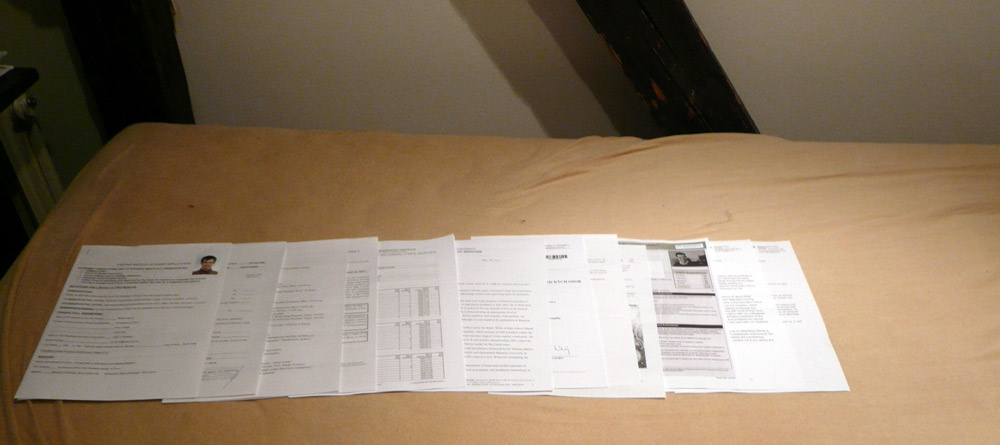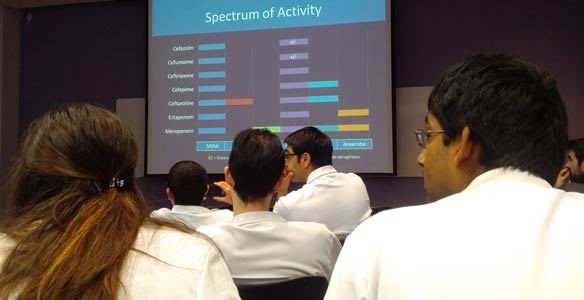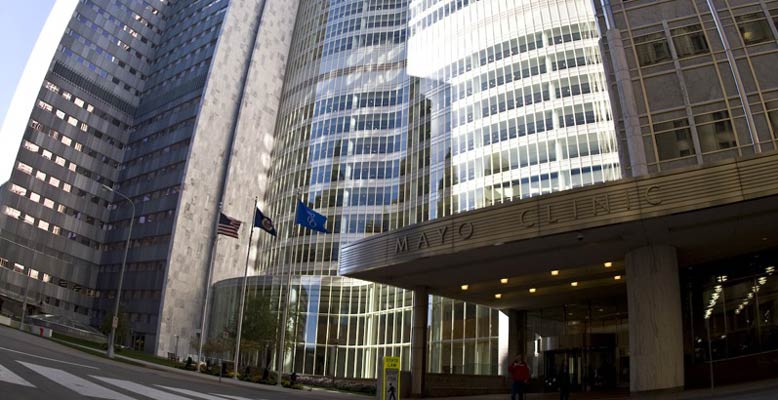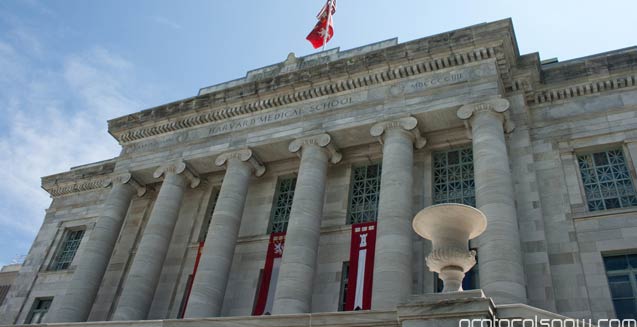Elective clerkship at US hospitals
How to apply and get elective in the US? A guide.

Exams scores tells how you can study and think. But real-life experience from the hospital gives you the feel what your future job is going to be like, and can help you decide for the right specialty. Also, personal evaluations from the US are important for the residency.
This article summarizes general ideas about electives in the US and shares my personal experience from Mayo Clinic and Cleveland Clinic.
Importance of Clinical experience
Enormous amount of time in medical school students spend studying textbooks and acquiring knowledge. However, a good doctor has more than clinical knowlege:
- ability to use the knowledge and interpret the findings in a particular patient,
- good communication skills and empathy with patients,
- good interpersonal manners with colleagues,
- desire to continually improve his/her service to patients.
Pros and Cons of clinical rotations in the US
OK, so it is important to do your best when on the rounds wherever you are. Why to do (and why not to do) the rotaions in the US?
+ residency match
Evaluation and letter of recommendation (LOR) from "hands-on" clerkship in US raises your chances in the Match.
US clinical experience (USCE) shows you can work well with english-speaking patients and colleagues in the US setting. But there is more than that...
Most of the medical universities in Europe follow the ECTS grading scale, giving a mark A-E for each subject.
Medical schools in the US differ. They might give only a pass/fail grade, or (especially for clinical clerkships) a verbal feedback or evaluation from the teacher.
A sentence obout the student performance might seem more personal and informative than crude "B".
However, grade inflation, a well known problem in the US in objective measures such as GPA, can even easily proliferate in verbal ratings, including LORs.
This means that "almost all" of your competitors for a residency position will be rated "in the upper quarter" in the LOR.
Yet your diploma will contain ECTS grades and LOR from non-US physicians will be considered less trustworthy and probably will not contain the information Residency program directors are looking for.
Therefore, US clinical elective is almost a "must have" in order to match for a US residency, because it provides your application with LOR from a US faculty member containing the praise that is expected.
+ specialty
During elective, you will deepen your knowledge in the specialty of your interest, and confirm whether it is (or isn't) the best career path for you.
You can choose your dream (sub)specialty, from neurosurgery and pediatric cardiology to health information systems or heamato-oncology.
US university hospitals are well equipped and might be on the top of the current research.
The "hands-on" experience and contacts from the US will be useful, especially if you decide to specialize in the field of your elective.
Furthermore, electives in US are very practical: you acquire some responsibilites of a junior resident. This helps you decide whether this type of work is what you want to do in your career.
+ culture
The work culture in US university hospitals is very busy and outcome-oriented, and there are many educational conferences.
Residents are working for 80 hrs per week and are restricted to work more. However, students are not restricted, and generally are expected to work about the same.
If you are wondering about doing residency in the US, you should be familiar with the US hospital working environment and the american culture in general.
Please note that if you're looking for a cultural experience, to meet different life attitudes, societies and religions, you might be more interested in the worldwide medical student exchanges organized by local branches of the IFMSA.
However, few american med students do international ecxhanges through IFMSA, therefore getting a reciprocal IFMSA exchange clership might not be possible in the US.
- curriculum incompatibility
Elective in the US might not fit to your final year study schedule. You might need to prolong your final year for a few months or a semester (which is pretty easy in the Czech republic).
- application paperwork
Major prerequisite for the application is the USMLE Step 1. However, there is much more than that and the process takes about 6 months. See a separate heading below with details.
- high costs
Living and eating in the US is expensive. Add the flight, tuition fee, insurance, app fee, and we are talking about thousands of USD per month.
| Frequent requirement | Institution | Price ($, 2014) |
|---|---|---|
| USMLE Step 1 | 1000 | |
| TOEFL | 230 | |
| Application fee | 0-350 USD for each app | |
| Tuition fee | 0 - 4500 | |
| Mayo, Cleveland Clinic, CWRU | 0 | |
| Harvard | 4500 | |
| Malpractice insurance: | academicins.com | 290 / month |
| nexus-insurance.net | 462 / 2 months | |
| Mayo Clinic | 0 | |
| Flight | 1000+ | |
| Accommodation | 1000+ | |
| Cleveland Clinic | 0 | |
| Food | 800+ / month | |
| Total | 4500+ |
Application
So once you've decided, how to apply? The application is not very straightforfard and itself may take several months. But don't be scared, here is a brief guide.
Which hospital/university to apply?
A good approach is to apply to the hospital where you want to apply for a residency (so called "audition elective"). Once you are there, you will see whether you fit to the work environment. Another advantage is that residency program director might remember you on the day of your residency interview.
Another approach is to apply to the hospitals renowned for its quality or rank. Working for a while at a top institution is good experience for you and looks great on your CV. It might seem difficult to get accepted, but don't be scared, it is certainly doable. Some famous hospitals (like Mayo Clinic, Cleveland Clinic, Harvard) accept quite a few visiting students, and the chances are quite high.
Exhaustive list of US universities accepting international med students
Application requirements

The required attachments of the application differs in every university/hospital. You can find the most up-to-date and precise information on website of the host institution (searching for "medical elective", "student clerkship", "visiting medical student").
However, there are documents that are required by most of the host institutions. Here I discuss them.
| Requirement | Notes / How to obtain it | Time |
|---|---|---|
| USMLE Step 1 | see a separate page how to pass it. Some universitities might not require step 1. | 6-12 months |
| TOEFL | you need usually > 26 per section, but NIH require >28 for listening and speaking. For preparation, "Official guide to TOEFL" is well enough. | 2 weeks |
| 2 Letters of recommendation (LOR) | If you've done something extra during your pre-clinical years, ask the professor for LOR. LOR from a clinician who supervised or examined you is great, especially of he/she is from the specialty of your elective. Just don't be shy. | 1-2 months |
| Dean’s letter | As explained here, the letter from a high official from your home university. It should state when are you going to be in the final year of med school, the expected date of graduation, your overall school performance (objective is better, e.g. "top 25% of students") and mention any your acomplishments related to study. | 1-2 months |
| Vaccinations | The "gold standart" is to ask your family physician for antibody titers (IgG) against HBs, Varicella zoster, Rubella, Mumps, Measles. Make a copy of this report and translation on a separate sheet (you may use this translated template of titer results) | 2-4 weeks |
| PPD | TB is not a big issue in Europe, but still you must have the PPD (i.e. tuberculin, Mantoux, in Czech "kalmetizace") skin test done. Many different names for the same test means you might search for a while in order to locate the nearest doctor performing the test. | 1-2 weeks |
| Motivation letter | Or "personal statement", explains your motivation, future plans/dreams, steps you have made in order to achieve these plans, and how this elective will move you forward. There is no right or wrong personal statement, it just must be interesting and yours. | 1-2 weeks |
| Transcript of records | The study department can get you an english version with an official stamp. | 1 week |
| CV | I am not going to repeat what has been explained well many times already. Specific for med students are clinical experience (where you can mention any rotations done elsewhere than at your university hospital) and research experience. | 1-2 weeks |
| Malpractice / Liability insurance | Check if your home or host institution provides one. Otherwise you have to rely on private providers - see the cost details above and consider searching for cheaper options. You are not required to purchase it before you are accepted for an elective: obtain a "quote" (letter from the insurer offering you insurance for a particular date for a particular price) and send this quote together with statement of intent (stating you are going to obtain the insurance once accepted) as part of your application. | 2-3 weeks |
| Personal insurance | Regular travel insurance. You might already have one with your debit card (Master, Visa). More serious and still cheap option is insurance through the ISIC card (price about 100 EUR in Czech). | 1 week |
| Criminal register record | Not always required. In Czech republic, the easiest way to go is to obtain a Czech version at CzechPoint, translate it into english (see a template) and have this translation validated by a notary translator. | 1-2 weeks |
| Application itself | The application (whether paper or electronic) usually needs to be confirmed by your home university. Allow time for the Dean or study department to sign/confirm it. My advice is to prepare several applications and hand them to the office at the same time. | 1-2 weeks |
| Total | Advanced paperwork, not including Step 1 | 3-9 months |
When to apply
It's not easy to manage the time with the application. You should apply about 6 months prior to the start of the elective. Completion of the application (during your regular schoolwork) might take 6 months. This means that ideally you should start to prepare the application at the beginning of the 5th year, and send it during the second half of the 5th year, in order to be able to attend electives throughout the sixth year.
This means that virtually right after you've done your Step 1, you should start to think about electives.
Some universities require application even earlier than 6 months in advance. At Cambridge, application for electives in 2016 is open during January-May 2015, 1.5 year in advance! In Toronto, visiting student can apply only during first 2 weeks in August.
Last edit: 10/2014




